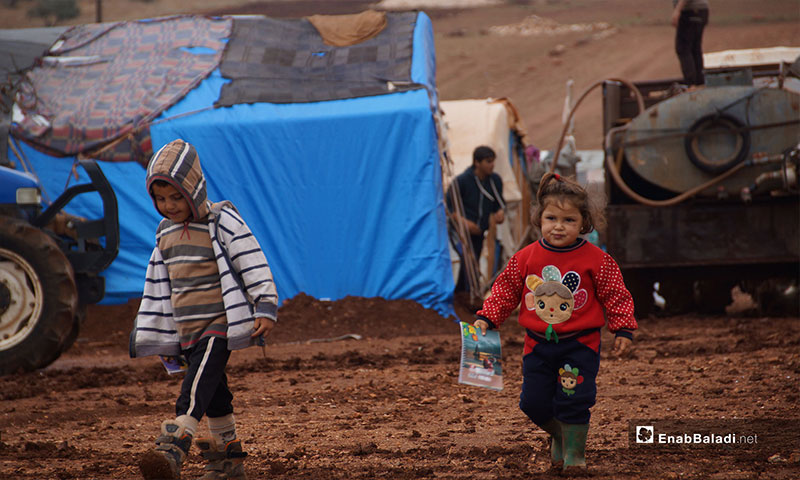



The suffering of the people displaced from the al-Ghab Plain, now based in southern rural Idlib, is increasing daily with the beginning of winter, especially that they were among the first to flee their towns and villages to escape the control of the Syrian regime.
The same pain persists in the shadow of almost complete absence of the humanitarian organizations and relief associations’ efforts in the al-Ghab Plain, while the displaced people are at the same time have been exploited by some entities for years.
Abdul Rahman Ibrahim, a mand displaced from the al-Ghab Plain and currently based in the town of Maar Tahroma, southern rural Idlib, told Enab Baladi that he was displaced from the village of Qabr Fidda in 2015, after the Assad’s forces took over the village and destroyed it completely.
Since then he has been living in a rented house in Maar Tahroma with his family, for he could not live in the camps fearful that his children’s health might be affected, adding that his living conditions are becoming more difficult with winter closing in and the lack of humanitarian aid for three years now, in addition to shortage of food materials, as he put it.
The activist Majid al-Hamwi, displaced from the al-Hakorh and also based in the Maar Tahroma, said: “People do not dispute over the idea that priority of the offered humanitarian aid is to newly displaced people, but to ignore the displaced people for a month or two or even three years is not accepted by anyone.”
“As for the people displaced from al-Ghab Plain in the town of Maar Tahroma, this is the fourth winter we witness without a person giving us a pack of bread; they are forgetful of the poor, who lost their land and homes, and some of whom have lost half of their families,” he added.
Majid al-Hamwi demanded that the civil society organizations turn an eye to the conditions of the people displaced from al-Ghab Plain and look into their living status.
Imad Hababeh, director of the Relief Office of the Maar Tahroma Town Local Council, told Enab Baladi that the number of the families displaced to the town, southern rural Idlib, from the different parts of Syria is 850 displaced families, in addition to the ones housing the residential project.
Hababeh stressed that since January 1, 2016, the displaced people have not received but a little aid, with the exception of one of the relief projects that targeted the families of martyrs, displaced people and residents only.
The director of the Relief Office at the Maar Tahroma town told Enab Baladi that the reason for the organizations and associations’ absence is a dispute with the “Hand in Hand for Syria” organization, which dates back to 2016, following the accusations that the displaced people made of the misconduct concerning the distribution of the aid and robbery of 30 food baskets, which triggered all the organizations to suspend their actions.
Hababeh said that the displaced people’s status is “deplorable,” for some of them were forced to sell their furniture to pay the rent and provide food and clothes, pointing out to an urgent need for fuel and heaters.
According to the director of the Relief Office, the relief organizations and associations were called on to help the displaced people, but the office have not yet received any response. At the same time, the activist Majid al-Hamwi said that he contacted many organizations to help the people displaced from al-Ghab Plain. However, he was met with rejection on the allegation that the organization’s resources are unable to accommodate the massive number of the displaced people, especially with the arrival of the people displaced from Daraa, Homs and rural Damascus, who have lately taken refuge in northern Syria.
if you think the article contain wrong information or you have additional details Send Correction